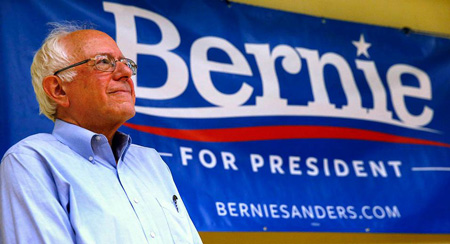I’m going to pick on my friend Ezra Klein today. He begins an essay about changes in American politics with a list of four recent developments in this year’s presidential primary race:
- First, Scott Walker, who looked to be the conservative establishment’s pick for the GOP nomination, dropped out of the race.
- Then John Boehner unexpectedly resigned from Congress….
- Then an NBC/Wall Street Journal poll was released showing Bernie Sanders merely 7 points behind Hillary Clinton….
- The same poll showed that Donald Trump, Ben Carson, and Carly Fiorina — the GOP’s true outsider candidates — have reached a combined 52
 percent in the polls, while Jeb Bush, the GOP’s top insider candidate, has plummeted from 23 percent to 7 percent.
percent in the polls, while Jeb Bush, the GOP’s top insider candidate, has plummeted from 23 percent to 7 percent.
“Let’s state the obvious,” says Klein. “No pundit anywhere predicted any two of these things back in June. Hell, I’m not aware of a pundit who predicted even one of them….The models we typically use to understand American politics are breaking down.”
Before we get to those models, let’s talk about whether they’re really breaking down in the first place. Klein is surely right that nobody predicted precisely the four things he mentions. But that sets the bar way too high. Nobody’s ever pretended that a model of politics can do that. Instead, let’s go through them in a more general sense:
- Every observer of primaries has written about the “winnowing” effect. This is exactly what it sounds like: some candidates will turn out to be worse than expected and will lose the support of donors and voters. Then they’ll drop out. Nobody ever knows exactly who this will be—that’s why we run actual races—but everyone expected that at least one or two seemingly strong candidates would drop out before the Iowa caucuses.
- Pundits have been talking about the possibility of Boehner resigning for at least a year. He has a thankless job these days and was basically forced out by the tea party. But speakers have lost support before—Newt Gingrich is the most dramatic recent example—and what happened to Boehner, though unusual, isn’t unheard of.
- Outsider candidates—Eugene McCarthy, Pat Buchanan, Ross Perot, Gary Hart, Bill Bradley—have a long history of spiking in the polls and giving establishment leaders fits. Sometimes they even win their primary battles, as George McGovern and Barack Obama did.
- OK, this one is pretty unusual.
Klein’s theory is that party insiders have lost a significant amount of influence in our brave new world of internet news sources and social media. And that might be true. But parties have been losing power for a long time, and changes in media infrastructure are nothing new. Candidates who took advantage of the rise of radio (FDR), then the rise of TV (Kennedy, Nixon), and then the rise of the web (Obama) have always done well. In terms of infrastructure, candidates have had to adapt to the rise of primaries, the rise of direct mail, the rise of microtargeting, and much more. Nothing ever stays the same.
Has social media fundamentally changed the landscape of presidential campaigns? I’m not really convinced. It’s certainly changed things, but I’m not sure it’s changed things any more than the routine-yet-seismic shifts that have been documented about once a decade in campaign tomes going back to Theodore White in 1960.1 Our traditional models of presidential politics need to keep up with the times, but my guess is that they’re not quite ready for the graveyard yet.
1Off the top of my head: television in the 60s; convention/nominating rules in the 70s; direct mail in the 80s; talk radio/cable news in the 90s; web/microtargeting in the 00s; social media in the teens.
POSTSCRIPT: But I admit that there has been one big change this year: the rise of the first name. We have Bernie, Hillary, Carly, and Jeb. Has there ever been a primary campaign with more candidates going by their first names? What’s up with that?














